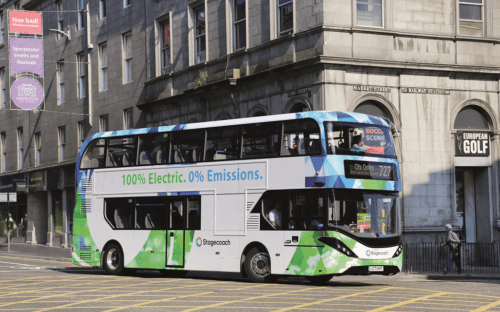
The Scottish Government has awarded £200,000 to the North East Bus Alliance through the Bus Partnership Fund for imporvements to bus infrastructure in Aberdeen. The funding will deliver bus priority infrastructure in Aberdeen city centre designed to reduce the impact of congestion on bus services. New bus lanes and gates are expected to be operational by the end of summer 2023, coinciding with the completion of other road improvements in the city, as part of the City Council’s wider City Centre Masterplan.
The Bus Partnership Fund is also supporting the development of a proposed Aberdeen Rapid Transit system for the region including bus priority on associated transport corridors into the city.
Chair of the North East Bus Alliance Robert Andrew said: “Investing in infrastructure for efficient and reliable bus services is crucial for quality public transport. Once in operation, the reduction in congestion for buses will lead to immediate improvements in punctuality and quicker journey times in the area and will be particularly beneficial for the many services across the north east that access Guild Street and the bus station. These improvements, enabled by the Bus Partnership Fund will soon be making a tangible impact for bus passengers, alongside ongoing improvements to the wider bus network, and supporting the development of Aberdeen Rapid Transit.”
The North East Bus Alliance is made up of local authorities, bus operators, Nestrans and other stakeholders. As part of the award, the expectation is that partners provide match investment and/or action to improve the entire bus offer.
The mooted Aberdeen Rapid Transit (ART) concept was developed by Nestrans and finalised in 2021. It aspires to provide fast, frequent and reliable services, which it says could be achieved through a combination of dedicated bus lanes and off-bus fare collection. The aspirational scheme has a vision of a cross-city network of ART priority routes using high-capacity and high-quality vehicles which it says would be ‘more than just a better bus service.’ The proposals were developed following research and analysis of successful schemes in other cities, with Belfast’s Glider and Bristol’s Metrobus cited as examples to follow.

